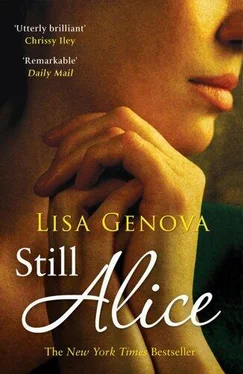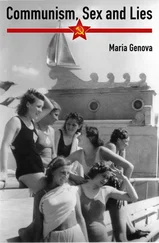"It's going to be negative, Ali."
"But that wouldn't change anything. It wouldn't mean I don't have it."
"Not technically, but it creates a whole lot more room for thinking this is something else."
"Like what? You talked to Dr. Davis. He already tested me for every cause of dementia you could come up with."
"Look, I think you jumped the gun going to see a neurologist. He looks at your set of symptoms and sees Alzheimer's, but that's what he's trained to see, it doesn't mean he's right. Remember when you hurt your knee last year? If you'd gone to see an orthopedic surgeon, he would've seen a torn ligament or worn cartilage, and he would've wanted to cut you open. He's a surgeon, so he sees surgery as the solution. But you just stopped running for a couple of weeks, you rested it, took ibuprofen, and you were fine.
"I think you're exhausted and stressed, I think the hormonal changes from menopause are wreaking havoc on your physiology, and I think you're depressed. We can handle all of these, Ali, we just have to address each one."
He sounded right. It wasn't likely that someone her age would have Alzheimer's disease. She was menopausal, and she was exhausted. And maybe she was depressed. That would explain why she didn't push back on her diagnosis harder, why she didn't fight to the teeth against even the suggestion of this doomed fate. It certainly wasn't characteristic of her. Maybe she was stressed, tired, menopausal, and depressed. Maybe she didn't have Alzheimer's disease.
Thursday:
7:00, Take your morning medications
Complete Psychonomic review
11:00, meeting with Dan, my office
12:00, Lunch Seminar, room 700
3:00, Genetic counselor appointment (John has info)
8:00, Take your evening medications
Stephanie was sitting behind her desk when they came in, but this time, she didn't smile.
"Before we talk about your results, is there anything you'd like to review about any of the information we went over last time?" she asked.
"No," said Alice.
"Do you still want the results?"
"Yes."
"I'm sorry to tell you, Alice, you're positive for the PS1 mutation."
Well, there it was, absolute proof, served straight up, no sugar, no salt, no chaser. And it burned all the way down. She could go on a cocktail of estrogen replacement, Xanax, and Prozac and spend the next six months sleeping twelve hours a day at Canyon Ranch, and it wouldn't change a thing. She had Alzheimer's disease. She wanted to look at John, but she couldn't will herself to turn her head.
"As we talked about, this mutation is autosomal dominant; it's associated with certain development of Alzheimer's, so this result fits with the diagnosis you've already received."
"What's the lab's false positive rate? What's the name of the lab?" asked John.
"It's Athena Diagnostics, and they cite a greater than ninety-nine-percent accuracy level of detection for this mutation."
"John, it's positive," said Alice.
She looked at him now. His face, normally angular and determined, appeared slack and unfamiliar to her.
"I'm sorry, I know you were both searching for a way out of this diagnosis."
"What does this mean for our children?" asked Alice.
"Yes, there's a lot to think about there. How old are they?"
"They're all in their twenties."
"So we wouldn't expect any of them to be symptomatic yet. Each of your children has a fifty percent chance of inheriting this mutation, which has a one hundred percent chance of causing the disease. Presymptomatic genetic testing is possible, but there's a lot to consider. Is this something they'll want to live with knowing? How would it change their lives? What if one of them is positive and one is negative, how will that affect their relationship with each other? Alice, do they even know about your diagnosis?"
"No."
"You might want to think about telling them soon. I know it's a lot to unload all at once, especially since I know you're both still absorbing it yourselves. But with a progressive illness like this, you can lay out plans to tell them later, but then you may not be able to in the way you originally wanted. Or maybe this is something you're going to leave to John to do?"
"No, we'll tell them," said Alice.
"Do any of your children have children?"
Anna and Charlie.
"Not yet," said Alice.
"If they're planning to, this might be really important information for them to have. Here's some written information I gathered that you can give them if you want. Also, here's my card and the card of a therapist who's wonderful with talking to families who've gone through genetic screening and diagnosis. Are there any other questions that I can answer for you now?"
"No, none that I can think of."
"I'm sorry I couldn't give you the results you were hoping for."
"Me, too."
Neither of them spoke. They got in the car, John paid the garage attendant, and they made their way onto Storrow Drive in silence. For the second week in a row, temperatures were well below zero with the windchill. Runners were forced indoors to either jog on treadmills or simply wait for slightly more habitable weather. Alice hated treadmills. She sat in the passenger seat and waited for John to say something. But he didn't. He cried the whole way home.
MARCH 2004
Alice popped open the Monday lid of her plastic days-of-the-week pill dispenser and poured the seven little tablets into her cupped hand. John marched into the kitchen with purpose, but seeing what she held, he spun on his heels and left the room, as if he'd walked in on his mother naked. He refused to watch her take her medications. He could be midsentence, midconversation, but if she got out her plastic days-of-the-week pill dispenser, he left the room. Conversation over.
She swallowed the pills with three gulps of very hot tea and burned her throat. The experience wasn't exactly pleasant for her either. She sat down at the kitchen table, blew on her tea, and listened to John stomping through the bedroom above her.
"What are you looking for?" she yelled.
"Nothing," he hollered.
Probably his glasses. In the month since their visit to the genetic counselor, he'd stopped asking her for help finding his glasses and keys, even though she knew he still struggled to keep track of them.
He entered the kitchen with quick, impatient steps.
"Can I help?" she asked.
"No, I'm good."
She wondered about the source of this newfound stubborn independence. Was he trying to spare her the mental burden of tracking his own misplaced things? Was he practicing for his future without her? Was he just too embarrassed to ask for help from an Alzheimer's patient? She sipped her tea, engrossed in a painting of an apple and a pear that had been on the wall for at least a decade, and listened to him sift through the mail and papers on the counter behind her.
He walked past her into the front hallway. She heard the hall closet door open. She heard the hall closet door shut. She heard the drawers in the hall table open and close.
"You ready?" he called.
She finished her tea and met him in the hallway. He had his coat on, glasses perched on his ruffled hair, and his keys in his hand.
"Yes," said Alice, and she followed him outside.
The beginning of spring in Cambridge was an untrustworthy and ugly liar. There were no buds yet on the trees, no tulips brave or stupid enough to have emerged through the now month-old layer of crusted snow, and no spring peeper audio track playing in the background. The streets remained narrowed by blackened, polluted snowbanks. Any melting that occurred during the relative warmth of midday froze with the plummeting temperatures of late afternoon, turning the paths in Harvard Yard and the sidewalks of the city into treacherous lanes of black ice. The date on the calendar only made everyone feel offended or cheated, aware that it was already spring elsewhere, and there people wore short-sleeve shirts and awoke to the sounds of robins chirping. Here, the cold and misery showed no signs of relenting, and the only birds Alice heard as they walked to campus were crows.
Читать дальше












